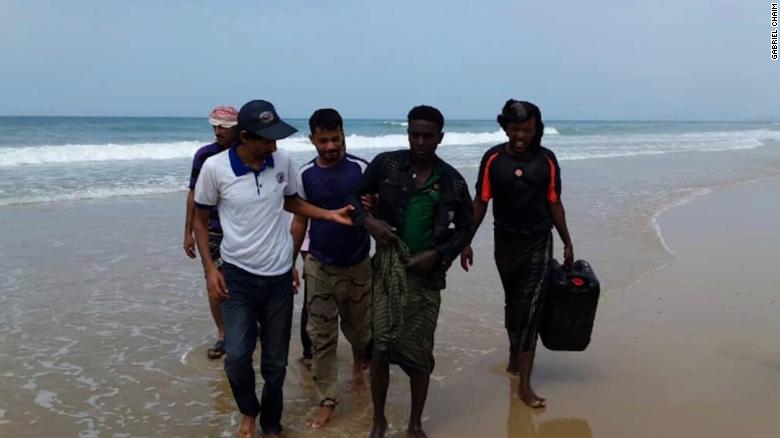A trek from poverty through a war zone they knew nothing about
Updated 0957 GMT (1757 HKT) June 10, 2018
(CNN)In small groups they trudge along the desolate desert road, young men and some women, from Somalia and Ethiopia. Some carry plastic bags with snacks, plastic water bottles, an extra scrap of clothing.
There are no trees, barely even any vegetation to provide a sliver of shade on this windswept road running along the Yemeni coast. But according to the International Organization for Migration (IOM), for as many as 7,000 people who pass this way every month from the Horn of Africa, reaching war-ravaged Yemen brings them ever closer to oil-rich Saudi Arabia, the land of milk and honey, jobs and hope.
Kamal Abdu, an 18-year-old from Ethiopia, arrived just a few hours ago after crossing the Red Sea at night from Somalia. He paid traffickers 5,000 Ethiopian birr -- about $180 -- for the passage.
And now he will walk several days to cross over into Saudi Arabia to find work. "Any work," he says.
He and others like him are largely unaware of the war that has been raging in Yemen for the past three years, a war that has left more than 10,000 dead, and that has brought the specter of famine and malnutrition to compound the misery of the poorest country in the Arab world.
Ahmed, also from Ethiopia, is making the journey for a simple reason: "For more money," he says. "We don't have any money. We will take any job. We don't have any money for food or water."
The desperation of people like Ahmed and Kamal is made clear by the danger of their journey. This week nearly 50 people were killed when the boat carrying them went down in the Red Sea. More than a dozen are still missing.
In one of the small fishing villages from which human traffickers operate, two men lounge in their long, thin white boat, still loaded with fishing nets.
The menŌĆöthey decline to give their namesŌĆödon't hesitate to say how they made a living.
"Trafficking," one says. "Yes, humans. Human trafficking."
When they're not bringing over refugees and migrants, they fish. But fishing just doesn't pay.
"We make in a day as much as we'd make in a month fishing," says the other.
They pride themselves in their knowledge of the sometimes treacherous waters, and insist they've never lost a customer. They then demonstrate how they place their passengers in the boat, sitting on the deck with knees bent to their chins. Their boat can hold around 30 people, they say, although other smugglers sometimes cram as many as 50 on board.
They say in an offhand manner that the Yemeni authorities don't interfere with their business.
Those who can try to sneak over the border into Saudi Arabia, but many never get that far.
Um Fatoum, from Somalia, comes every day from a nearby camp to a dusty roadside gas station and rest stop to beg. Holding her young daughter, she describes conditions in the camp.
There's "nothing," she says. "No water, no food, no government." She says she and her daughter sleep in a cardboard box.
I was in Yemen in July 2007. Back then, the story was about people fleeing war and grinding poverty in the Horn of Africa, and many dying along the way.
At a UN-run refugee camp I met Mohammed Abdi Al-Bukr, from the Somali capital of Mogadishu. He had paid traffickers for the passage across the Red Sea to Yemen. When their boat was within sight of the Yemeni coast, the traffickers ordered the passengers to jump overboard. Mohamed protested. They beat him with their rifles and then threw everyone into the sea. Mohamed survived, but his wife and five children, including the youngest, his 2-year-old son, drowned. Mohammed was still tormented by nightmares.
War has come to Yemen in the years since. Beyond that, little has changed.







